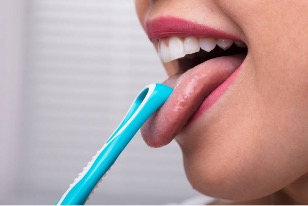In modern medicine, the tongue is not just an organ for taste and speech. It is considered to be a miniature copy of the entire body. In other words, the state of your tongue—its shape, color, coating or texture indicates the state of your overall health.
In this column, we will discuss the importance of taking proper care of your tongue.
The human tongue is made of eight muscles. It is three to four inches long with thousands of invisible taste buds. What you may not know is that the color of the tongue tells the story of its health. A uniformed pink color is a tell-tale sign of a healthy tongue.
The significance of brushing your teeth twice a day, flossing in between the teeth is emphasized much, but the importance of cleaning the tongue is often overlooked. It does not matter how diligently you brush your teeth you cannot get rid of bad breath unless your tongue is clean. Cleaning your tongue can aid in the removal of bacteria that is responsible for bad breath. An unclean tongue harbors a large number of germs that are trapped in a protective biofilm. This can give rise to a lot of dental problems including plaque and tartar buildup, tooth decay or gum disease.
Six critical reasons why a clean the tongue is so important:
- Cleaning your tongue increases your tasting ability. An unclean tongue is laced with bacterial plaque affecting the thousands of taste buds making them less functional. When this happens, you are unable to pick up the taste of food fully. You are better to discern foods that are sweet, salty, bitter and sour.
- Cleaning increases the appearance of your tongue. When your tongue is coated with germs it appears to have a white film over it. Scaping this film with a tongue cleaner will enhance the appearance of the tongue and boost your confidence.
- Cleaning your tongue reduces bacterial load. Bacteria are the main culprits for most dental diseases such as plaque, bad breath, tooth decay or gingivitis. Studies show that regular scraping of the tongue reduces the multiplication of bacteria like Streptococcus mutans and Lactobacilli inside the mouth.
- Cleaning your tongue reduces bad breath. Bad breath occurs due to reduced flow of saliva and an excessive bacterial build-up on the top of the tongue. If uncleaned, a colony of bacteria forms, called a biofilm. This biofilm keeps the bacteria intact and regular mouthwash are unable to get to the source of the germs. The result is bad breath. Scraping the tongue is a great way to clean your tongue and effectively reduce bad breath.
- Cleaning your tongue serves as a boost to your overall health
Bacteria are harmful not only in the oral cavity, but they can also spread to other parts of the body via systemic circulation. Thus, getting rid of the bacteria improves not only your oral health but also your overall health. In fact, oral health itself is a significant determinant of overall health. - Better digestion. Digestion of food starts in the mouth. Enzymes present in the saliva break food down for easier digestion by the gut. When the taste buds are blocked due to accumulated mucus on the tongue, the messaging function for digestion is impaired.
There are three ways to clean the tongue. Brushing with a soft bristled brush and using a professional mouth rinse can assist in the removal of bacteria. On the other hand, the practice of scraping the tongue is more effective. It involves the use of a u-shaped tool or a scraper to remove the debris and bad bacteria. If the toxins remain, they are absorbed back in the body and can lead to diseases and weaken immunity.
Since a clean tongue is a vital part of oral hygiene, scraping your tongue serves as the best practice in building a strong immune system and good health.
Dr. Kendal V. O. Major is Founder and CEO of Center for Specialized Dentistry which is a comprehensive family dental practice operating in Nassau and Freeport. He is the first Bahamian Specialist in gum diseases and dental implants since 1989. He also is a certified Fastbraces provider. His practice is located at 89 Collins Avenue, Nassau at (242)325-5165 or [email protected].

Tongue scraper is the best tool to clean tongue

White coating on tongue and sign of germs and malodor





